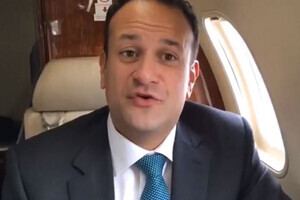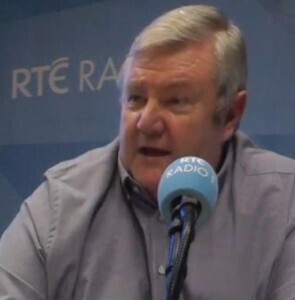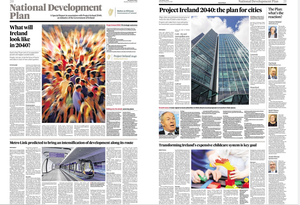From top: Taoiseach Leo Vardkar in a video from the Government jet in October; Derek Mooney
Though it would probably be more accurate to call it an idiom than a word, “fake news” is now 2017’s new word of the year. Not just in English. Norway’s Language Council pronounced ‘fake news’ (falske nyheter) as the new Norwegian word of the year saying:
“The word is not completely new, but its use has exploded over the last year… It is a word that has set the agenda and was given a lot of attention during the 2016 US election, and that attention has continued.”
Though they probably said it in Norwegian.
Though idiom has its origins in last year’s US Presidential slug fest, it has come to be the hallmark of Trump’s presidency. A few months back we saw President Trump bizarrely claim, in an interview with fellow Republican nut job Mike Huckabee that was so soft (and full of crap) that it could have been sponsored by Cushelle toilet rolls, that he invented the word “fake”.
It is not only the charge Trump levels at established news organisations who put out stories or commentaries he does not like, it is also the tactic that Trump’s surrogates use to deflect criticism.
It is our “whataboutery” times a thousand, but where our “whataboutery” is intended to just shut the other side up for a while, the intention of “fake news” is to erode any public trust and faith in the truth.
“Fake news” is not new, back in the 1930s the Nazis had another name for it: lügenpresse – the lying press. It is just the means of delivery that has changed.
As we have seen in the Brexit referendum, plus in elections in Germany and France, “fake news” is not confined to one country or continent. How could it? Its modern means of delivery is global, social media.
But here we should stress that the two are not synonymous. Social Media is just the tracks on which this runaway train is rolling, it is the train we need to stop, there is no public benefit in ripping up the tracks.
It would naïve in the extreme to imagine that dear little, sweet little Ireland will be immune from the phenomenon. Just because we have not yet been the sights of an “Alt-Right” “fake news” factory somewhere in Moscow so far, it doesn’t mean we might never be.
Neither should we be so green as to imagine that others with differing motivations and political inclinations would not be happy to use these tactics to further their own agenda.
Last week’s initiative by Fianna Fáil’s Science and Technology spokesperson, James Lawless aimed to address some of these concerns. His Online Advertising and Social Media (Transparency) Bill 2017 was debated in the Dáil last week, and was passed at Second Stage. At this point I should declare that James is an old friend of mine and discussed the Bill with me some weeks ago.
Lawless’s Bill proposes to address the difficulties with online authentication and identification and thus close off the opportunities currently available for, in his own words: “more advanced actors to game the system in the technological space and to pretend to be other than who they are, operate multiple fake accounts or run sponsored advertising”.
A laudable ambition which most would applaud, you would think… but no. Though Lawless’s Bill was supported by his own Fianna Fáil party, as well as Sinn Féin, Labour, the Greens, the Social Democrats and several independents, it was opposed by Fine Gael, govt supporting Inds and their newly found BFFs in PBP.
Though the Government indicated its broad support in principle for the Bill’s aims and intentions, it then said it was opposing it. Rather than looking to amend any flaws or anomalies at committee and report stages in the Dáil and Seanad, which is, afterall, the purpose of our complex ten stage legislative scrutiny process, it sought to kill it off.
But, the two sole Fine Gael speeches in last week’s Dáil second stage debate give the game away. They were concerned that the Bill, which seeks to heighten transparency in online political advertising, might stymie the operations of their Strategic Communications Unit (SCU).
Passing James Lawless’s Bill might mean no more videos of Leo addressing us from the inside Government Jet or the teaspoon slot of the dishwasher. Well actually no, it would not mean no more videos, just no more of them being pushed and promoted on the State credit card.
Fortunately, the Dáil saw the difference and Lawless’s Bill was passed last week and it now proceeds for its Committee Stage sometime in 2018.
All’s well that ends well, says you. Eh, not quite.
Having lost the vote and having failed to stop the Bill that it fears may frustrate its SCU it then suddenly finds a similar initiative of its own that it can share with the media over the weekend.
On Sunday night the online edition of the Irish Independent was able to report on a letter sent by the Minister of State for Older People urging the EU Commission:
“…to consider a new policy that will require multinationals, such as Facebook, to introduce new and stronger methods of authenticating accounts created on their platforms”
This was barely four days after they had tried, and failed, to defeat James Lawless’s Online Advertising and Social Media (Transparency) Bill 2017.
Curious, how there was no mention of this initiative from the government side in the Second Stage debate last Tuesday?
Even more curious when you consider that Minister Daly told the Irish Independent that he is on a cross-departmental group led by Minister for Communications and includes Ministers for Justice and for Children. Only one of those Ministers contributed to last week’s Dáil debate and he never mentioned it.
You would have thought someone in Leo’s joined-up government would have thought to mention this important cross-departmental group in a Dáil debate on the issue of online transparency? Surely the group didn’t just suddenly pop out of mid air after the debate, or even late on Sunday night?
Looks like Leo’s government has found a new way of operating: denounce one thing today and then hail it as your own idea the next. I have given previous examples of this approach here, here and here.
All they need now is a new word that describes it. Who knows, it may even become the 2018 word of the year?
Derek Mooney is a communications and public affairs consultant. He previously served as a Ministerial Adviser to the Fianna Fáil-led government 2004 – 2010. His column appears here every Tuesday morning. Follow Derek on Twitter: @dsmooney








Hooray, more mixed up spins from the imagination of grandmaster derek and the FF….
White lies… running through my mind…
:-J
“Passing James Lawless’s Bill might mean no more videos of Leo addressing us from the inside Government Jet or the teaspoon slot of the dishwasher. Well actually no, it would not mean no more videos, just no more of them being pushed and promoted on the State credit card.”
Derek, what part of the bill would prevent this? you linked to the bill – can you quote the part that would prevent this? If not – you’re full of it
…which technically makes Derek’s article “Fake news”.
Which is, you know ironic.
I’m guessing this is it.
(2)Online political advertising shall not be paid for from monies provided out of the Central Fund or the growing produce thereof or from monies voted by the Oireachtas.
That seems pretty clear cut to me.
except it says ““online advertising” means any communication which is placed or promoted for a fee on an online platform;”
The legislation only applies to *ads* that the user pays to place (not pays to create).
Unless FG are paying BS (or twitter) to run pictures of him filling the dishwasher – it wouldn’t be covered by the proposed legislation.
“Fake news” appeared out of nowhere in the first week of November 2016.
The exact same time as a child trafficking and exploitation ring was exposed in Washington DC.
Pizzagate was 100% real and still is.
But the people who plan the news needed a narrative change, and they need it fast.
They didn’t have time to come up with a bespoke solution, as our friend from Stokes Kennedy Crowley might say.
So they took one off the shelf.
THAT solution was “Fake News”.
Now, I’ll sit back and wait for the same few people who feel the need to riddicule any idea that is held by relatively few people in society, when it contradicts that which appears in their morning paper and which THEY ‘know’ to be false.
Off you go lads…
Good man Ivan, you are doing your bit, anyhow.
+1 M
…fake news is a new name for an old strategy known in this country as spin…Derek is a self-acknowledged practioner of this dark art and the supreme exponent features in another piece on Broadsheet today…never anything fake about the irony in Derek’s drivel…
FIanna Fail keep claiming there are no Independent Ministers appearing in these ads as justification for this bill, Shane Ross is in 2 of them. http://dublinstreams.blogspot.com/2017/12/fianna-fail-false-claims-used-to.html